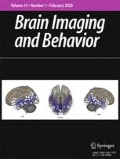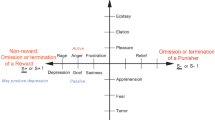Abstract
Previous studies suggest obesity is associated with altered function within the insula and dorsomedial frontal cortex (including dorsal anterior cingulate cortex; DMFC/dACC), reflecting abnormal reward processing and reduced sensitivity to feelings of satiety. Given the proposed roles of DMFC/dACC in monitoring response conflict and reward-based decision making, the present study examined DMFC/dACC activation, and functional connectivity between the DMFC/dACC and the anterior insula (AI), during food-related decision-making. Twenty participants recruited from the general population (10 Female) performed a decision task while undergoing functional magnetic resonance imaging. They were instructed to “choose the healthier option” when simultaneously shown pairs of images of different foods. Significant DMFC/dACC activation was observed during food-related decision-making, and activation levels also positively correlated with self-reported cravings for high-fat foods (r = 0.57, p = 0.009) and self-reported desire to eat the high-fat foods depicted in the images (r = 0.48, p = 0.032). Negative functional connectivity estimates between the right AI and DMFC/dACC were also associated with self-reported control over eating (r = −0.50, p = 0.025). These results suggest that (1) more intense cravings for unhealthy foods are associated with greater response conflict when deciding between healthy and unhealthy food options, and (2) lack of eating-related control may involve a reduced influence of insula-mediated bodily signals on decision-making. This task may offer a neuroimaging-based probe for identifying individuals vulnerable to eating-related disorders and should be replicated in clinical populations.


Similar content being viewed by others
References
Botvinick, M., Cohen, J., & Carter, C. (2004). Conflict monitoring and anterior cingulate cortex: An update. Trends in Cognitive Sciences, 8(12), 539–546. doi:10.1016/j.tics.2004.10.003.
Brooks, S., Cedernaes, J., & Schiöth, H. (2013). Increased prefrontal and parahippocampal activation with reduced dorsolateral prefrontal and insular cortex activation to food images in obesity: A meta-analysis of fMRI studies. PloS One, 8(4), e60393. doi:10.1371/journal.pone.0060393.
Brown, J., & Braver, T. (2005). Learned predictions of error likelihood in the anterior cingulate cortex. Science, 307(5712), 1118–1121. doi:10.1126/science.1105783.
Candeias, V., Armstrong, T., & Xuereb, G. (2010). Diet and physical activity in schools: Perspectives from the implementation of the WHO global strategy on diet, physical activity and health. Canadian Journal of Public Health, 101(Suppl), S28–S30.
Carnell, S., Gibson, C., Benson, L., Ochner, C. N., & Geliebter, A. (2012). Neuroimaging and obesity: Current knowledge and future directions. Obesity Reviews, 13(1), 43–56. doi:10.1111/j.1467-789X.2011.00927.x.
Craig, A. D. (2003). Interoception: The sense of the physiological condition of the body. Current Opinion in Neurobiology, 13(4), 500–505.
Craig, A. D. (2009). How do you feel--now? The anterior insula and human awareness. Nature Reviews Neuroscience, 10(1), 59–70.
Del Rio, D., Cano, V., Martín-Ramos, M., Gómez, M., Morales, L., Del Olmo, N., & Ruiz-Gayo, M. (2015). Involvement of the dorsomedial prefrontal cortex in high-fat food conditioning in adolescent mice. Behavioural Brain Research, 283, 227–232. doi:10.1016/j.bbr.2015.01.039.
Domenech, P., & Koechlin, E. (2015). Executive control and decision-making in the prefrontal cortex. Current Opinion in Behavioral Sciences, 1, 101–106. doi:10.1016/j.cobeha.2014.10.007.
Dunning, D., Heath, C., & Suls, J. (2004). Flawed self-assessment: Implications for health, education, and the workplace. Psychological Science in the Public Interest, 5(3), 69–106. doi:10.1111/j.1529-1006.2004.00018.x.
Gaykema, R., Nguyen, X.-M., Boehret, J., Lambeth, P., Joy-Gaba, J., Warthen, D., & Scott, M. (2014). Characterization of excitatory and inhibitory neuron activation in the mouse medial prefrontal cortex following palatable food ingestion and food driven exploratory behavior. Frontiers in Neuroanatomy, 8, 60. doi:10.3389/fnana.2014.00060.
Gitelman, D., Penny, W., Ashburner, J., & Friston, K. (2003). Modeling regional and psychophysiologic interactions in fMRI: The importance of hemodynamic deconvolution. NeuroImage, 19(1), 200–207. doi:10.1016/S1053-8119(03)00058-2.
Hare, T., Camerer, C., & Rangel, A. (2009). Self-control in decision-making involves modulation of the vmPFC valuation system. Science, 324(5927), 646–648. doi:10.1126/science.1168450.
Hare, T., Malmaud, J., & Rangel, A. (2011). Focusing attention on the health aspects of foods changes value signals in vmPFC and improves dietary choice. Journal of Neuroscience, 31(30), 11077–11087. doi:10.1523/JNEUROSCI.6383-10.2011.
Jezzini, A., Mazzucato, L., La Camera, G., & Fontanini, A. (2013). Processing of hedonic and chemosensory features of taste in medial prefrontal and insular networks. The Journal of Neuroscience, 33(48), 18966–18978. doi:10.1523/JNEUROSCI.2974-13.2013.
Kaye, W., Fudge, J., & Paulus, M. (2009). New insights into symptoms and neurocircuit function of anorexia nervosa. Nature reviews. Neuroscience, 10(8), 573–584. doi:10.1038/nrn2682.
Kelley, A. (2004). Ventral striatal control of appetitive motivation: Role in ingestive behavior and reward-related learning. Neuroscience and Biobehavioral Reviews, 27(8), 765–776. doi:10.1016/j.neubiorev.2003.11.015.
Kerns, J., Cohen, J., MacDonald III, A., Cho, R., Stenger, V., & Carter, C. (2004). Anterior cingulate conflict monitoring and adjustments in control. Science, 303(5660), 1023–1026. doi:10.1126/science.1089910.
Killgore, W., & Yurgelun-Todd, D. (2005). Body mass predicts orbitofrontal activity during visual presentations of high-calorie foods. Neuroreport, 16(8), 859–863.
Killgore, W., & Yurgelun-Todd, D. (2010). Sex differences in cerebral responses to images of high versus low-calorie food. Neuroreport, 21(5), 354–358. doi:10.1097/WNR.0b013e32833774f7.
Killgore, W., Young, A., Femia, L., Bogorodzki, P., Rogowska, J., & Yurgelun-Todd, D. (2003). Cortical and limbic activation during viewing of high- versus low-calorie foods. NeuroImage, 19(4), 1381–1394. doi:10.1016/S1053-8119(03)00191-5.
Killgore, W., Kipman, M., Schwab, Z., Tkachenko, O., Preer, L., Gogel, H., et al. (2013a). Physical exercise and brain responses to images of high-calorie food. Neuroreport, 24(17), 962–967. doi:10.1097/WNR.0000000000000029.
Killgore, W., Schwab, Z., Weber, M., Kipman, M., DelDonno, S., Weiner, M., & Rauch, S. (2013b). Daytime sleepiness affects prefrontal regulation of food intake. NeuroImage, 71, 216–223. doi:10.1016/j.neuroimage.2013.01.018.
Killgore, W., Weber, M., Schwab, Z., Kipman, M., DelDonno, S., Webb, C., & Rauch, S. (2013c). Cortico-limbic responsiveness to high-calorie food images predicts weight status among women. International Journal of Obesity, 37(11), 1435–1442. doi:10.1038/ijo.2013.26.
van der Laan, L., de Ridder, D., Viergever, M., & Smeets, P. (2011). The first taste is always with the eyes: A meta-analysis on the neural correlates of processing visual food cues. NeuroImage, 55(1), 296–303. doi:10.1016/j.neuroimage.2010.11.055.
McLaren, D., Ries, M., Xu, G., & Johnson, S. (2012). A generalized form of context-dependent psychophysiological interactions (gPPI): A comparison to standard approaches. NeuroImage, 61(4), 1277–1286. doi:10.1016/j.neuroimage.2012.03.068.
van Meer, F., Charbonnier, L., & Smeets, P. (2016). Food decision-making: Effects of weight status and age. Current Diabetes Reports, 16(9), 84. doi:10.1007/s11892-016-0773-z.
Naqvi, N., Rudrauf, D., Damasio, H., & Bechara, A. (2007). Damage to the insula disrupts addiction to cigarette smoking. Science, 315(5811), 531–534. doi:10.1126/science.1135926.
Naqvi, N., Gaznick, N., Tranel, D., & Bechara, A. (2014). The insula: A critical neural substrate for craving and drug seeking under conflict and risk. Annals of the New York Academy of Sciences, 1316, 53–70. doi:10.1111/nyas.12415.
Ridderinkhof, K., Ullsperger, M., Crone, E., & Nieuwenhuis, S. (2004). The role of the medial frontal cortex in cognitive control. Science, 306(5695), 443–447. doi:10.1126/science.1100301.
Silvetti, M., Alexander, W., Verguts, T., & Brown, J. (2014). From conflict management to reward-based decision making: Actors and critics in primate medial frontal cortex. Neuroscience and Biobehavioral Reviews, 46(Pt 1), 44–57. doi:10.1016/j.neubiorev.2013.11.003.
Stice, E., Figlewicz, D., Gosnell, B., Levine, A., & Pratt, W. (2013). The contribution of brain reward circuits to the obesity epidemic. Neuroscience and Biobehavioral Reviews, 37(9 Pt a), 2047–2058. doi:10.1016/j.neubiorev.2012.12.001.
Volkow, N., Wang, G.-J., Fowler, J., & Telang, F. (2008). Overlapping neuronal circuits in addiction and obesity: Evidence of systems pathology. Philosophical transactions of the Royal Society of London. Series B, Biological sciences, 363(1507), 3191–3200. doi:10.1098/rstb.2008.0107.
Weissman, D., Gopalakrishnan, A., Hazlett, C., & Woldorff, M. (2004). Dorsal anterior cingulate cortex resolves conflict from distracting stimuli by boosting attention toward relevant events. Cerebral Cortex, 15(2), 229–237. doi:10.1093/cercor/bhh125.
Werthmann, J., Roefs, A., Nederkoorn, C., Mogg, K., Bradley, B., & Jansen, A. (2013). Attention bias for food is independent of restraint in healthy weight individuals—An eye tracking study. Eating Behaviors, 14(3), 397–400. doi:10.1016/j.eatbeh.2013.06.005.
Zavala, B., Tan, H., Little, S., Ashkan, K., Hariz, M., Foltynie, T., et al. (2014). Midline frontal cortex low-frequency activity drives subthalamic nucleus oscillations during conflict. The Journal of Neuroscience, 34(21), 7322–7333. doi:10.1523/JNEUROSCI.1169-14.2014.
Ziauddeen, H., & Fletcher, P. (2013). Is food addiction a valid and useful concept? Obesity Reviews, 14(1), 19–28. doi:10.1111/j.1467-789X.2012.01046.x.
Ziauddeen, H., Farooqi, I., & Fletcher, P. (2012). Obesity and the brain: How convincing is the addiction model? Nature reviews. Neuroscience, 13(4), 279–286. doi:10.1038/nrn3212.
Author information
Authors and Affiliations
Corresponding author
Ethics declarations
Funding
This study was funded by a USAMRAA grant to WDSK (grant number W81XWH-09-1-0730).
Conflict of interest
Ryan Smith declares that he has no conflict of interest. Anna Alkozei declares that she has no conflict of interest. W.D. “Scott” Killgore declares that he has no conflict of interest.
Ethical approval
All procedures performed in studies involving human participants were in accordance with the ethical standards of the institutional and/or national research committee and with the 1964 Helsinki declaration and its later amendments or comparable ethical standards.
Rights and permissions
About this article
Cite this article
Smith, R., Alkozei, A. & Killgore, W.D.S. Conflict-related dorsomedial frontal cortex activation during healthy food decisions is associated with increased cravings for high-fat foods. Brain Imaging and Behavior 12, 685–696 (2018). https://doi.org/10.1007/s11682-017-9726-7
Published:
Issue Date:
DOI: https://doi.org/10.1007/s11682-017-9726-7




